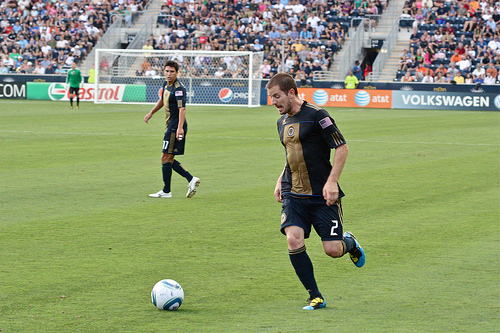When you ask the Philadelphia Union’s veteran leaders what the team needs to do to excel next season, they say one word: Consistency.
Danny Califf: “Consistency.”
Alejandro Moreno: “Consistency.”
And if there is one player who embodies that characteristic it is defender Jordan Harvey.
In 2009, Harvey played about 2,600 minutes. He had a few assists and a few shots on goal. Nothing that stands out on the stat sheet.
But Peter Nowak and the Union didn’t go into the expansion draft looking for stand-outs, they wanted solid, team players. And with Harvey that’s exactly what they got.
2010 Statistics
Jordan Harvey’s 2010 numbers are eerily similar to the stats he put up with Colorado. More than 2,600 minutes and an assist. He gave up about one foul per game and accumulated three yellow cards. And there was also that goal. Oh, what a goal.
High Point
The Union traveled to Toronto fresh off the first win in franchise history. They had a new hero in Sebastian Le Toux and felt like they belonged after bouncing back from a somnambulant loss to Seattle. As the first half came to a close, the Union appeared stunned: They had pressed and created chances, but found themselves a goal and a man down. Danny Califf’s elbow on De Guzman and De Rosario’s goal on the ensuing free kick had all the momentum with Toronto. With the half drawing to a close, Moreno and Le Toux traded passes until Torres popped free in the final third. Harvey himself can describe the rest.
“This was a clear-cut great ball by Roger and a great combo before that,” Harvey said. “I was a bit surprised at my first touch but I somehow buried it with my right. I looked around because I was kinda surprised. It was the best moment of my career.”
Harvey certainly didn’t arrive in Philly with a goal-scoring pedigree. He is a steady defender with a strong positional sense and a team-first attitude. “Coming into the season, we were expecting the ups and downs, expecting a tough start,” Harvey said. “Given the away games [early in the year], it was going to be a tough one. Throughout the season I thought we progressed well.”
Playing behind inverted wingers like Fred and Roger Torres meant Harvey was asked to take an aggressive approach to the left back position, something he understood from the outset. “I wanted to attack more and be in a more attacking role,” Harvey said. “Throughout the season, you’re going to play teams that have good right flank players. Your goal, then, is to shut down that guy. You pick your battles every game.”
And while the Union’s defensive struggles have been well-chronicled, Harvey was always one of the first names on the team sheet.
Low Point
At DC United, Harvey and the rest of the Union defense were well below standard. And while Harvey wasn’t directly responsible for either goal the team surrendered, he had trouble containing rookie Andy Najar all night. Additionally, the outside backs offered very little going forward for a team that was struggling to find any width against an unorganized but motivated DC squad. If there is one major criticism of Harvey’s game, it’s that he tends to reflect the mood of the team rather than set it. When Philadelphia was playing well, Harvey moved up to fill the wide spaces, but when they were struggling, he was often absent from his role as an outlet for the more central players.
Strengths
Harvey was consistent all season. He was rarely the best player on the pitch, but he was rarely the scapegoat. He adjusted extremely well to the arrival of Sheanon Williams and recognized his role in the defense when the right back got forward and left holes in the back. Harvey’s partnership with Orozco-Fiscal on the left side of the defense shored up a problem area for the Union, and Harvey did it all while playing without normal wingers in front of him.
Weaknesses
On a team that values ball control and passing accuracy, there were times that Harvey struggled to keep up. He isn’t as comfortable with the ball at his feet as a lot of the Union’s regular starters. Luckily, this is something Harvey plans to address. “This offseason I’m going to work on more technical aspects of the game,” Harvey said. “Strength and conditioning as well. I’ll talk with the coach and see what he wants from me.”
Outlook
Unless something major changes in the offseason, Harvey will be expected to reprise his role as the everyday left back in 2011. The Union protected him from the expansion draft, and there isn’t anybody in the organization prepared to challenge for the starting job. With Sheanon Williams projected to start on the opposite side of the defense, Harvey will have to become one of the leaders on the field. He will have to read the game well and recognize when to jump into the attack and when to stay at home to guard against the counterattack.
“I would like to see myself being in more of a leadership role in the future,” Harvey said. “Right now we have the older guys who are the vocal leaders of the group. I leave the vocals to the veterans. I just make sure I have a good work rate and a good work ethic.”
It’s simple and straightforward, but it’s hard to argue with Harvey’s outlook. Everywhere he goes, he takes the starting job and keeps it.


RECENT COMMENTS